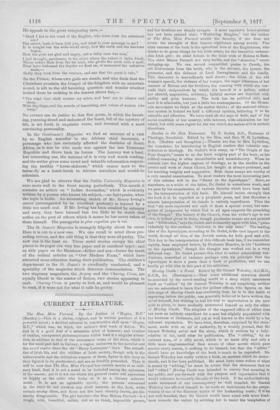Studies in the New Testament. By F. Godet, D.D., Professor
of Theology, Neuchatel. Edited by the Hon. and Rev. W. Li. Lyttelton, (Hodder and Stoughton.)—Thanks are due to Mrs. Lyttelton, the translator, for introducing to English readers this valuable con- tribution to theology. Dr. Godet's first essay, on " The Origin of the Pour Gospels," seems to us the least -weighty part of the book, as his critical reasoning is often inconclusive and unsatisfactory. When he ascends into the higher regions of theology, as in the studies on the person and work of Jesus Christ, his insight is always profound, and his teaching weighty and suggestive. Both those essays are worthy of a very careful examination. To most readers the most interesting part of this volume will be the "Essay on the Apocalypse." Here, as elsewhere, as a critic of the letter, Dr. Godet is sometimes weak, and wo pass by his examination of various theories which have been held on the interpretation of this book. He himself insists strongly that the book is to be regarded as a prophetic' poem, and that therefore a minute interpretation of its details is entirely superfluous. Thus the first "six seals represent not each of them a special event, but cate- gories of judgments by which God in all ages supports the preaching of the Gospel." The history of the Church, from the writer's ago to our own, is Indeed glven in them, though particular events are not pointed out. "Edification ," says Dr. Godet, and we heartily agree with him, "gains infinitely by this method. Curiosity is the only loser." The leading idea of the Apocalypse, according to Dr. Godet, is the vast import to the world, through all time, of the Jewish nation, for both good and evil. This key to the interpretation of this difficult book has, if we remember rightly, been employed before, by Professor Maurice, in his "Lectures on the Apocalypse," though the thought was worked out in a very different way. Dr. Godet presses this view to rather astonishing con- elusions, somewhat at variance perhaps with his principle that the Apocalypse is more a poem than a book of prediction, and we can hardly go with him in this part of his criticism.






























 Previous page
Previous page